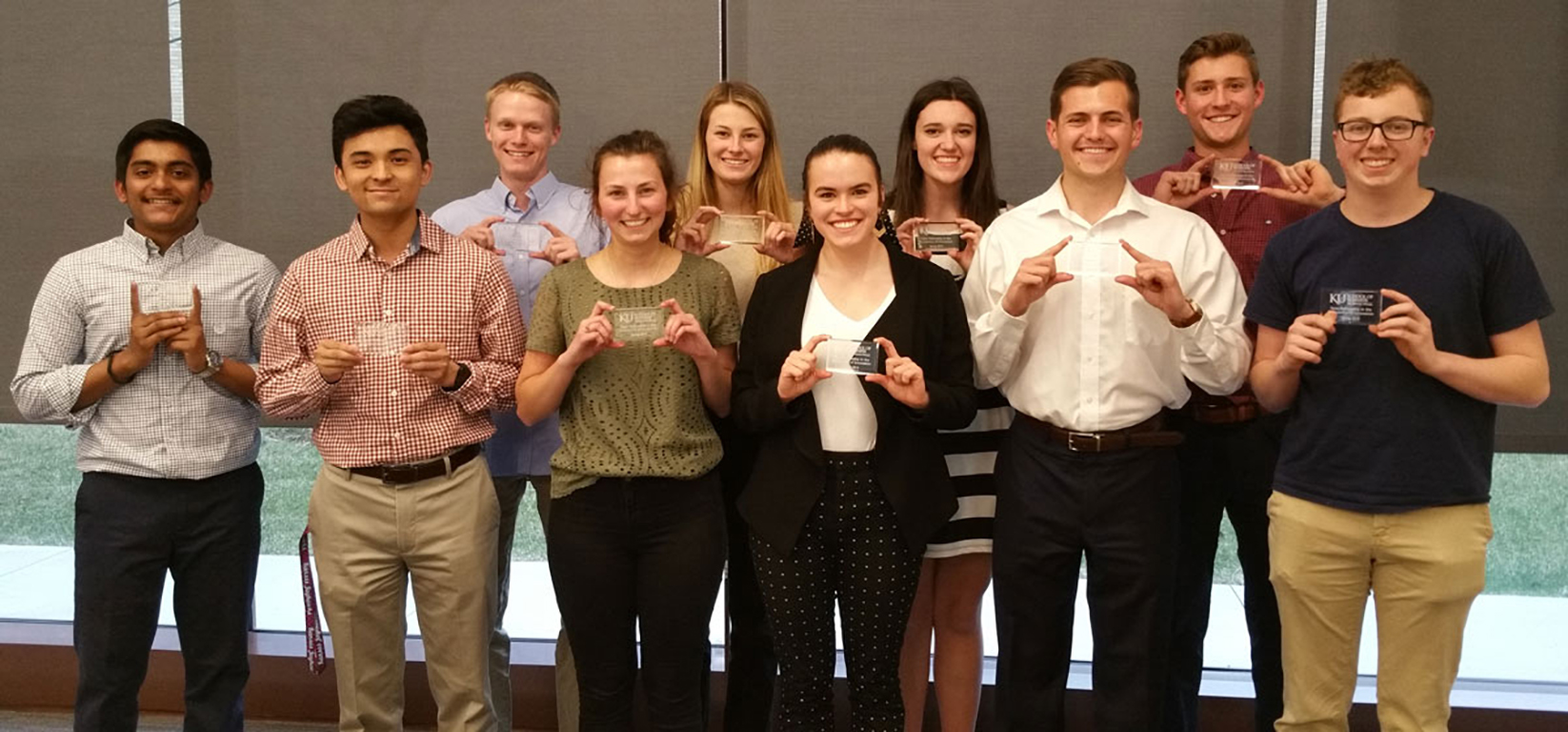Brandmeyer Center for Applied Economics
Center information
The Brandmeyer Center for Applied Economics helps advance the economic development of the state and region by offering economic analysis and economic education relevant for policymakers, community leaders and other interested citizens. Economists at the Brandmeyer Center also teach economics courses offered by the KU School of Business.
When elected officials, community leaders and citizens discuss issues that may have an impact on the economic development potential of the state or region, they can benefit from a wide array of perspectives. The center focuses on the contributions that markets and economic institutions can make to economic development. Because credibility is, in part, a function of economic literacy, the center also promotes economics education.
Strategic scope
Operating out of the KU School of Business, the center strives to fulfill its mission by engaging in three basic types of activities:
- Generating and transmitting ideas about how market mechanics can solve problems.
- Editing and brokering the ideas of others.
- Developing the economic thinking skills of the citizenry across the region.
Strategic plan
Economic research and policy analysis
The center conducts and promotes basic research on economic development, and uses that research to engage in region-specific policy analysis. The center supports original research aimed at identifying factors or policies that propel economic growth. It also focuses on synthesizing existing research to make the knowledge understandable to and relevant for decision-makers in the business and public policy communities.
In brief, the center is designed to add value in the following ways:
- Synthesize: specializing in combining existing research activity with practical policies.
- Inform: generating original research using various experts throughout the country.
- Solidify: turn research into consensus on what policies work most effectively to promote prosperity.
Economics education
The center provides continuing education to working professionals using seminars, workshops and other approaches that accommodate the compressed time frame required to serve such professionals. The center experiments with different content formats to address the requirements of different professional groups.
The center also provides forums for experiential learning for both working professionals and traditional students. Economics concerns the study of human action. Educators can forcefully demonstrate the axioms of economics by using role-playing exercises and experimental economics methods. The center uses exercises and experiments that focus on conveying the importance of the relation between economic development and different "rules of the game."
The Brandmeyer Center has an array of research products under development. Some publications focus in-depth on particular economic development issues, while others are more general to help individuals improve their economic thinking skills.
For more information about any of the publications listed below, please email Art Hall, assistant teaching professor.
Kansas research
Perspectives on Economic Development Incentives and Economic Growth in Wichita
This report, published by the Kansas Policy Institute, offers an analytical framework for evaluating economic development incentive — and broader economic growth prospects — for the city of Wichita.
A Fiscal History of Kansas: The "Brownback Experiment" in Historical Context
This report details prominent aspects of Kansas fiscal policy during the administration of Governor Sam Brownback, and strives to place the policy changes into a coherent historical context.
The Kansas "School Finance Wars"
This report explores the fiscal and legal aspects of the many lawsuits mounted against the constitutionality of numerous Kansas school finance formulas.
A Primer on the Underfunding of the Kansas Public Employees Retirement System
This report details how structural reforms to KPERS implemented in the early 1990s interacted with the national economic recessions of 2001 and 2008 to cause the chronic underfunding of KPERS.
The Economics of Restoring Live Horse Racing and Greyhound Racing in Kansas
This report, commissioned by The Greater Kansas Racing Alliance, offers an economic impact analysis of restoring live horse racing and greyhound racing in Kansas.
An Evaluation of the Kansas Affordable Airfares Program (Feb. 2013 and FY 2016)
This white paper, underwritten by a grant from the Kansas Department of Commerce, presents an evaluation of the Kansas Affordable Airfares Program, a legislative initiative for “the development and implementation of a program to provide more air flight options, more competition for air travel and affordable air fares for Kansas.”
The Kansas Oil and Gas Industry: An Enduring Model of High-Tech Entrepreneurship
This report documents the consistent economic contribution the oil and gas industry has made to the Kansas economy. It quantifies past contributions and contemplates future contributions.
Major Structural Deficits Looming in Kansas
This report, underwritten and published by the Kansas Policy Institute, contemplates several forward-looking scenarios for the Kansas budget (and also provides a history of select trends).
A Profile of the Broadband Internet Industry in Kansas
This report surveys the structure of the broadband internet industry in Kansas and discusses the dynamics of the industry in the context of national trends.
Kansas Property Taxes: A Comparison Among Cities
This report uses hypothetical property types to make inter-state and intra-state property tax burden comparisons for select Kansas cities.
Charter Schools: An Introduction and Discussion for the Case of Kansas and Surrounding States
This report discusses various issues associated with economic research related to charter schools, with a general application to Kansas and surrounding states.
An Economic Case for Increased Competition in the Sale of Beer, Wine and Spirits in the State of Kansas
This study investigates the economic changes that could take place if more retail outlets were legally permitted to sell beer, wine, and spirits. The report was underwritten and published by the Coalition for Jobs and Consumer Choice.
Profile and Comparison of Kansas K-12 Employment Levels
This report, published by the Kansas Policy Institute, attempts to quantify, in comparison with other states, the levels and growth rates of people employed in the service of the Kansas K-12 public school system.
Embracing Dynamism: The Next Phase in Kansas Economic Development Policy
This report, underwritten and published by Kansas, Inc., offers a critical appraisal of certain elements of Kansas economic development policy. It also offers recommendations for improvement.
Reforming Medicaid in Kansas: A Plan for Improving Quality and Reducing Costs
This report discusses the reasons that Medicaid tends to offer such poor service and provides a framework for how Kansas can reform its Medicaid program to offer higher quality at lower cost. The report also references reforms in the Florida Medicaid system.
A Comprehensive Retail Sales Tax as a Single Tax for the State of Kansas
This report explores the economic issues related to a particular tax reform idea: replacing all state-level taxes in Kansas with a single tax. The single tax in this case is a comprehensive retail sales tax.
Technology-Based Economic Development in Kansas: Issues, Opportunities, and Strategies
This report, underwritten and published by Kansas, Inc., explores general economic principles and specific Kansas history with regard to technology-based economic development. It also offers recommendations for improvement.
The Funding Crisis in the Kansas Public Employees Retirement System
This report details why the Kansas Public Employees Retirement System is bankrupt under current operating assumptions. It also suggests reasons why the system should transform from a defined-benefit arrangement to a defined-contribution arrangement (like the one used by the Kansas Board of Regents).
Kansas Perspective on Taxpayer Migration
This document provides an executive summary, from a Kansas perspective, of the center's report titled "The County-to-County Migration of Taxpayers and their Incomes, 1995-2006."
A History of Manufacturing in Kansas: Profile of an Economic Strength
The report, underwritten and published by Kansas, Inc., documents and analyzes the growth trends and dynamic compositional changes related to manufacturing that have taken place in Kansas.
Proposition K: A Better Property Tax System for Kansas
This study, underwritten and published by the Flint Hills Center for Public Policy, provides an argument and conceptual design for a property tax system that replaces the age-old ad valorem system.
The Relationship Between School Funding and Student Achievement in Kansas Public Schools
This report evaluates the impact of public school funding on student performance in Kansas. It finds no statistically significant relationship between per-student funding and test scores. It finds weak evidence of a positive relationship between per-student funding and graduation rates.
Expensing: A Competitive Leap for Kansas Tax Policy
This brief discusses an income tax procedure known as "expensing." It explains how it works and why implementing it would make the Kansas tax code more investment-friendly.
The County-to-County Migration Patterns of Kansas Taxpayers, 1985-2004
This report provides detailed analysis of the annual county-to-county migration patterns of taxpayers (IRS filers) in Kansas. The report is supplemented by a spreadsheet file that provides detailed information for each of the 105 counties in Kansas. Please read the "Description" tab of the spreadsheet to understand how to find the information you want.
Economic Growth and Productivity in the Regions of Kansas, 1969-2003
This article, published in the spring 2006 issue of the Kansas Policy Review, evaluates economic growth and productivity trends among the Plains states and the different regions of Kansas.
Property Tax Comparisons Among Kansas Localities and Select Cities of the United States
This study, underwritten and published by Kansas, Inc., uses hypothetical homestead, commercial, and industrial properties to accurately compare property tax burdens across 118 Kansas localities, over decade-by-decade intervals, from 1975 to 2005.
A Brief Economic History of Kansas, 1969-2003 (Executive summary; Parts 1, 2, 3, 4, 5 & 6)
This report highlights key findings from a set of six companion reports that investigate long-term economic trends in Kansas from different perspectives. The Center produced the six different reports for Kansas, Inc.
Economic Change in Kansas Counties: A Data Supplement to "Exaggerated Tales of Rural Economic Decline"
This brief supplements the tables in the center's report entitled Exaggerated Tales of Rural Economic Decline with tables that contain Kansas-specific information on changes in population, employment, and income, 1970 - 2000.
The Kansas Productivity Puzzle
This report provides a situation analysis of the Kansas economy. It highlights the historic trends of key economic variables that both identify and relate to poor productivity growth in Kansas.
The Factors That Lead to Rural Economic Development
This brief reviews the economic evidence with regard rural economic development and how the evidence may relate to Kansas.
The Growth of Cities and Rural Economic Development
This brief explains how reports of rural economic decline are often exaggerated due to the way in which government statisticians define "rural." It also explains the economic development importance of proximity to population centers.
General Research
Public Employee "Other Post Employment Benefit" Plans
This report, published by the American Legislative Exchange Council, surveys non-pension public employee retirement benefit plans (so-called Other Post Employment Benefit plans) in a sample of states. The report makes a case for shifting from a defined-benefit to a defined-contribution approach for funding such benefits as a way to help legislators budget in a manner that limits unexpected liabilities for future taxpayers.
State Pension Funds Fall Off Cliff
This report, published by the American Legislative Exchange Council, analyzes state defined-benefit pension plans in light of the 2007 recession. It uses Colorado and Kansas as case studies. It recommends that states begin shifting their defined-benefit plans to defined-contribution plans.
The County-to-County Migration of Taxpayers and Their Incomes, 1995-2006
This report evaluates the patterns and determinants of year-to-year migration patterns of taxpayers among all U.S. counties in the 48 contiguous states. It also provides a review of other migration-related studies.
Evaluating Roads as Investments: A Primer on Benefit-Cost and Economic-Impact Analysis
Based on a review of select Midwestern states, public decision makers rarely analyze road projects as investments. The prioritization of transportation funds can improve substantially if decision makers established rigorous and reliable benefit-cost analysis protocols. This report offers an introduction to the issues and procedures involved.
Entrepreneurship, Innovation, and Technological Change
This report offers a primer on the complicated relationship among three key components of the economic development process. Readers will benefit from the expansive definition of the term "entrepreneurship."
Public Policy and Entrepreneurship
This report offers a framework for understanding the entrepreneurial process and assesses the academic evidence regarding the array of policies used to stimulate entrepreneurship.
Biotechnology Centers and Technology-Based Economic Development
The purpose of this report is to foster a broad and general understanding of the relationship between the establishment of biotechnology centers and economic development at the state level, and to consider whether a state biotechnology center is a critical infrastructural element of a state's overall economic development strategy. The evidence is not conclusive that a state biotechnology center is the most efficient way for a state to stimulate its biotechnology industry.
Principles of Regulation and Competition Policy for the Telecommunications Industry
This report articulates a set of economic principles to assist policymakers in their deliberations on the issue of deregulation in telecommunications markets. The key question confronting policymakers concerns when the discipline imposed by competition can substitute for the discipline imposed by regulation. The complexity of this question is exacerbated by the technological dynamics of the industry. It is critical that any test for deregulation be structured and dutifully applied in a manner that promotes consumer welfare rather than the welfare of individual competitors. The risk is that an improperly designed test for deregulation will serve anti-competitive rather than pro-competitive ends.
Competing Concepts of Income and the Double Taxation of Saving
This report explains how the definition of income adopted for the income tax system in the United States (at both the federal and state levels) imposes an inherent double tax on the process of saving, which impedes economic growth and development. Policy makers can eliminate the growth impediment and simultaneously simplify the administration of income tax systems by adopting an alternate economic definition of income.
The Impact of High-Speed Internet Access on Local Economic Growth
This report measures the impact of high-speed Internet access on local economic growth. The results suggest that high-speed Internet access increases growth in earnings per worker, aggregate earnings and the number of firms, but it lowers the rate of growth of employment. All of these effects were larger in less densely populated areas, suggesting that rural areas do benefit disproportionately from high-speed internet access.
Business Climate Indexes: Which Work, Which Don't, and What Can They Say About the Kansas Economy?
This report examines the link between state economic growth and the most prominent business climate indexes that have been published over the past two decades.
If You Build it, Will They Come?
This report provides a review and synthesis of the many economic studies that have attempted to assess whether public highway expenditures have resulted in improved economic grow. On balance, over the past three decades, the evidence indicates that such expenditures re-organize patterns of regional commerce rather than contribute to net new growth. One can find localized exceptions to this general finding.
Economic Factors Related to the Development and Commercialization of Biotechnologies
Biotech is all the rage in professional economic development circles these days. Forty-one states have created policy initiatives to develop biotechnology into an engine of state economic growth. This report is a primer on the biotech "industry" and the complex market interactions associated with creating successful biotechnologies.
Exaggerated Tales of Rural Economic Decline
This report explains how frequent stories of rural economic decline in the United States have been exaggerated because of consistent measurement error on the part of researchers. Such error misinforms the policy-making process.
Brandmeyer Center for Applied Economics faculty

Vann Fellowship
The Brandmeyer Center offers the Vann Fellowship in the Economics of Innovation in the Spring semester. Inspired by KU alumnus Kyle D. Vann, who received his bachelor’s in chemical engineering in 1969, the Vann Fellowship offers a one-semester, high-impact extracurricular program to engineering students that wish to explore the economics of innovation—specifically, the economic logic that drives Joseph Schumpeter’s famous idea of “creative destruction.”
Vann believes he would have benefited by understanding the fundamentals of entrepreneurship-driven economic thinking earlier in his scholastic career and wanted to put his wisdom into action for young people that aspire to become future leaders.
Van Fellowship students
- Josh Haxton
- Adam Andresen
- Will Thomas
- Jet Semrick
- Tanishka Shah
- Thao (Mimi) Nguyen
- Elizabeth Davidson
- Jui Nagarkar
- Juan Alega
- Suyash Sakhare

- Conner Gartner
- Ally Steinmetz
- Amanda Nelson
- Jacob Scott
- Achal Patel
- Hoang Nguyen
- Katie Zimmerman
- Piper Rogers
- Nick Latimer
- Colin Sherman
- Cameron Kroonenberg
- Jatin Mangal
- Ashley Allen
- Ethan Brenner
- Davy Depew
- Adam Hupp
- Zak Kulphongpatana
- Amy Leuszler
- Nick Mechler
- Elizabeth Peterson
- Katherine Riedel
- Justin Schreiner
- Nooshin Shahlari
- Michael Svoren
- Anna Wilson

